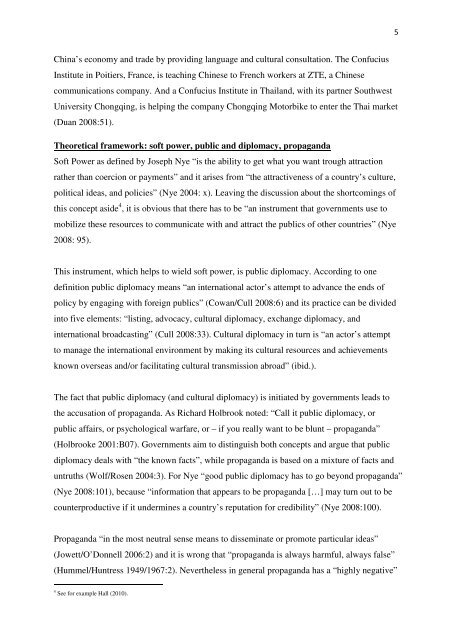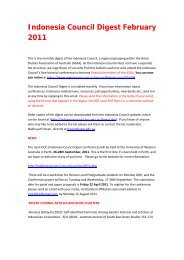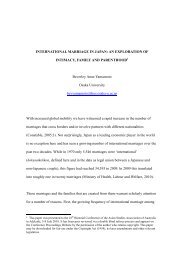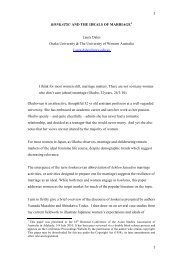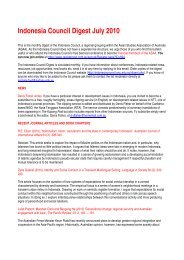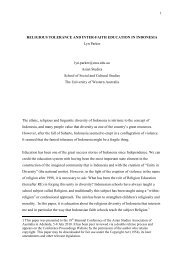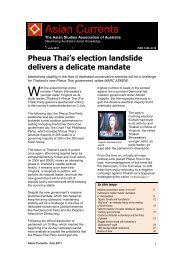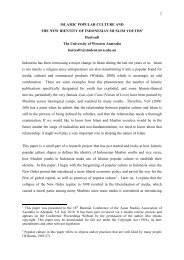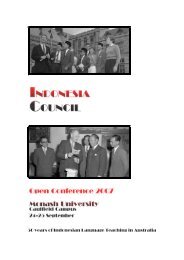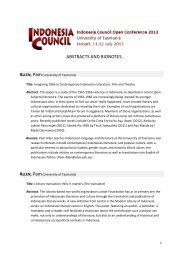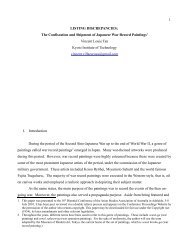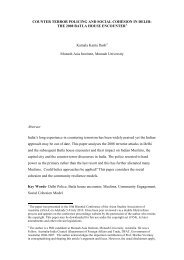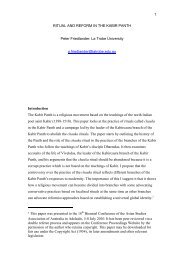CONFUSION ABOUT CONFUCIUS INSTITUTES Soft Power Push or ...
CONFUSION ABOUT CONFUCIUS INSTITUTES Soft Power Push or ...
CONFUSION ABOUT CONFUCIUS INSTITUTES Soft Power Push or ...
You also want an ePaper? Increase the reach of your titles
YUMPU automatically turns print PDFs into web optimized ePapers that Google loves.
China’s economy and trade by providing language and cultural consultation. The Confucius<br />
Institute in Poitiers, France, is teaching Chinese to French w<strong>or</strong>kers at ZTE, a Chinese<br />
communications company. And a Confucius Institute in Thailand, with its partner Southwest<br />
University Chongqing, is helping the company Chongqing Mot<strong>or</strong>bike to enter the Thai market<br />
(Duan 2008:51).<br />
The<strong>or</strong>etical framew<strong>or</strong>k: soft power, public and diplomacy, propaganda<br />
<strong>Soft</strong> <strong>Power</strong> as defined by Joseph Nye “is the ability to get what you want trough attraction<br />
rather than coercion <strong>or</strong> payments” and it arises from “the attractiveness of a country’s culture,<br />
political ideas, and policies” (Nye 2004: x). Leaving the discussion about the sh<strong>or</strong>tcomings of<br />
this concept aside 4 , it is obvious that there has to be “an instrument that governments use to<br />
mobilize these resources to communicate with and attract the publics of other countries” (Nye<br />
2008: 95).<br />
This instrument, which helps to wield soft power, is public diplomacy. Acc<strong>or</strong>ding to one<br />
definition public diplomacy means “an international act<strong>or</strong>’s attempt to advance the ends of<br />
policy by engaging with f<strong>or</strong>eign publics” (Cowan/Cull 2008:6) and its practice can be divided<br />
into five elements: “listing, advocacy, cultural diplomacy, exchange diplomacy, and<br />
international broadcasting” (Cull 2008:33). Cultural diplomacy in turn is “an act<strong>or</strong>’s attempt<br />
to manage the international environment by making its cultural resources and achievements<br />
known overseas and/<strong>or</strong> facilitating cultural transmission abroad” (ibid.).<br />
The fact that public diplomacy (and cultural diplomacy) is initiated by governments leads to<br />
the accusation of propaganda. As Richard Holbrook noted: “Call it public diplomacy, <strong>or</strong><br />
public affairs, <strong>or</strong> psychological warfare, <strong>or</strong> – if you really want to be blunt – propaganda”<br />
(Holbrooke 2001:B07). Governments aim to distinguish both concepts and argue that public<br />
diplomacy deals with “the known facts”, while propaganda is based on a mixture of facts and<br />
untruths (Wolf/Rosen 2004:3). F<strong>or</strong> Nye “good public diplomacy has to go beyond propaganda”<br />
(Nye 2008:101), because “inf<strong>or</strong>mation that appears to be propaganda […] may turn out to be<br />
counterproductive if it undermines a country’s reputation f<strong>or</strong> credibility” (Nye 2008:100).<br />
Propaganda “in the most neutral sense means to disseminate <strong>or</strong> promote particular ideas”<br />
(Jowett/O’Donnell 2006:2) and it is wrong that “propaganda is always harmful, always false”<br />
(Hummel/Huntress 1949/1967:2). Nevertheless in general propaganda has a “highly negative”<br />
4 See f<strong>or</strong> example Hall (2010).<br />
5


